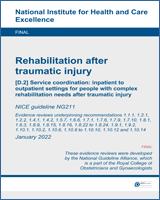
NCBI Bookshelf. A service of the National Library of Medicine, National Institutes of Health.
| Themes and subthemes | Quality | No. of studies | Populations covered | ||
|---|---|---|---|---|---|
| Contribution by injury type (no. of studies) | Sub-groups as specified in the protocol (no. of studies) | ||||
| Theme 1: Compatibility across healthcare disciplines | |||||
| 1.1 |
Setting common goals In order to increase coordination between disciplines during discharge, healthcare professionals should endeavour to set goals that are common across healthcare settings. Progress should be monitored using standardised measurements, including quality of life. | Very low | 1 | TBI (1) | [none] |
| Theme 2: Resources | |||||
| 2.1 |
Case workers A designated case worker can act as an additional resource for families during discharge, acting as a knowledgeable intermediary between healthcare staff and families. | Very low | 1 | TBI (1) | [none] |
| 2.2 |
Importance of community support Families who have a child with ABI can help support other families re-integrate into the community after discharge. Social media can facilitate this by building stronger connections between parents/carers or support groups. | Very low | 1 | TBI (1) | [none] |
ABI: Acquired brain injury; TBI: Traumatic brain injury

NCBI Bookshelf. A service of the National Library of Medicine, National Institutes of Health.